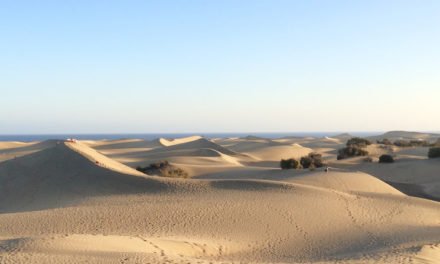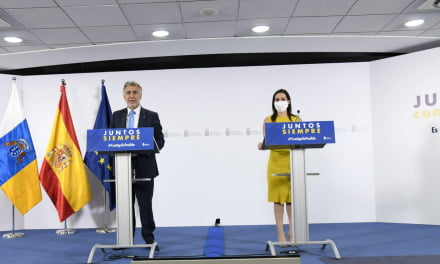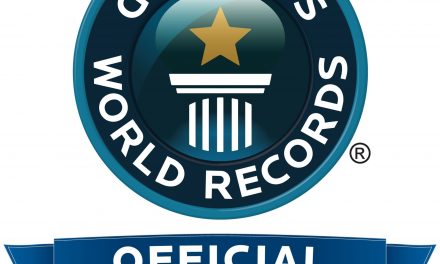
Pedro Ortega says that the Government of the Canary Islands will ask the State that the new electricity grid planning includes the necessary infrastructures for the energy generated by offshore wind on the islands
Regular readers may remember that just less than one year ago the world’s first self-erecting telescopic offshore wind turbine was completed here on Gran Canaria, built in the port of Arinaga, and installed alongside the Canary Islands Oceanic Research Platform PLOCAN, off the coast of Telde. Those passing recently may have noticed that the turbine has at last begun operation, as the proof of concept for the Elsican project which has last more than five years, culminating in this ground-breaking, disruptive new technology.
At the beginning of April more than a hundred institutions, promoters and entrepreneurs specialising in wind and renewable energy production came from various points of Spain, Europe and the United States for the “I Encuentro de Energía del Mar”, which was held on the 5th of April 2019, at the Alfredo Kraus auditorium in Las Palmas de Gran Canaria.
Among the advantages offered by the islands for the development of this type of energy, Pedro Ortega, The Canary Island’s Minister for Economy highlighted, is “the rapid increase in depth from the coast; the power of the wind, which in much of the areas exceeds the requisite speeds for investment in offshore wind; and the short distance that it would be necessary to cover for the installation of evacuation cables for the generated energy”.
“All of these are optimal conditions to promote the implementation of experimental and pre-commercial marine wind facilities,” added the Minister.
In addition, Pedro Ortega also referred to the research centres that already exist in the archipelago, “which are a benchmark at the international level, and where steps are already being taken in the testing of renewable marine energy technologies”.
He spoke of the launch, last March 17, of the Elisa marine wind turbine, the first of its kind in Spain, just off the coast of Gran Canaria, “which will soon be joined by two other prototypes, in the same zone occupied by PLOCAN”.
He also confirmed that “PLOCAN with the support of the Technological Institute of the Canary Islands, is testing devices for harnessing wave energy”, while highlighting the participation of the Canary Islands in several European projects, such as ENERMAC, which, among others objectives, analyses marine resources to achieve the maximum penetration of renewables and reduce energy dependence in the archipelagos of Macaronesia and West Africa.
The Minister of Economy recalled that the draft Energy Strategy of the Canary Islands for 2025 includes the implementation of at least 310 megawatts of offshore wind power, within the objective of achieving a 45% penetration of renewable energies, and explained that “within the Government of the Canary Islands they are taking the necessary steps to reach this goal “.
“We have asked the Ministry of Ecological Transition to create the first Working Table of Marine Wind Energy in order to delimit the marine areas in which the exploitation and use of the wind resources should be centred, without harming other activities; and to specify, at the same time, the work we have been doing for months to promote the implementation of R + D + i projects in this field “.
At present, the offshore wind industry has grown almost five fold since 2011, according to data provided by the World Bank, which makes this sector an important business opportunity for territories with marine wind resources such as the Canary Islands.
As explained, the momentum of the offshore wind sector is an essential part of the Blue Economy Strategy that the Government of the Canary Islands, in collaboration with all the agents involved, is developing to promote the growth of the various activities that are linked to the sea, and contribute to diversify the economy.
The celebration of the I International Meeting of Energy of the Sea was part of the Mid Atlantic Ship Repair and Supply Summit, organised by the Port Authority of Las Palmas and the Puerto Las Palmas Foundation, in collaboration with the Government of the Canary Islands, which included work sessions on naval repairs, supplies, industry 4.0 and renewable marine energy.
The Canary Guide











